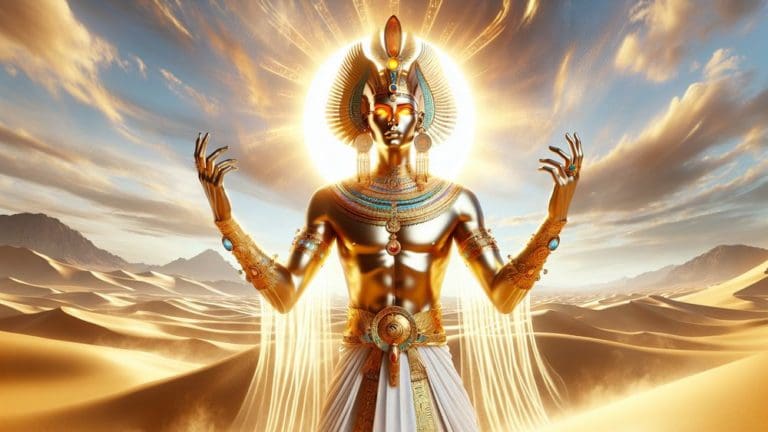Hypnos: Greek God Of Sleep And Twin Brother Of Thanatos
Greek mythology is filled with interesting characters, and few are as fascinating as Hypnos, the god of sleep. Think about the calm feeling you get after a long day; Hypnos rules over this area. As you look into this blog post, you’ll learn where Hypnos comes from and about his family, including his twin brother, Thanatos, who means death.
Key Points:
- Hypnos is the Greek god of sleep, birth from Night (Nyx) and Darkness (Erebus).
- Twin brother of Thanatos, who means death, they both handle sleep and death, the end of the day and life.
- Hypnos appears in many old Greek writings, including Homer’s ‘Iliad’ and Hesiod’s ‘Theogony’.
- Hypnos used his power to control sleep and dreams, even over the king of the gods, Zeus.
- Hypnos is often connected with symbols like the poppy, horn of sleep, and the inverted torch.
- Artworks often display Hypnos as a young man with wings on his temples or shoulders.
- Hypnos’ influence is still seen today in books, movies, and even modern psychology and sleep studies.
We will look at old books like Homer’s “Iliad” and Hesiod’s “Theogony,” and see how Hypnos dealt with gods and people. You will also find stories about Hypnos like the story about Hypnos and Endymion and see what he did during the Trojan War. Additionally, we will talk about the symbols linked with Hypnos and how he has appeared in art through time.
At the end, we will see Hypnos in today’s world and science, and look at other mythologies with sleep gods. Get ready to learn more about the stories and legends involving Hypnos, and understand more about this interesting character from Greek mythology.
Hypnos: Overview and Key Facts
| Key Point | Description |
|---|---|
| Name | Hypnos (Ὕπνος) |
| Role | God of Sleep |
| Parents | Nyx (Night) and Erebus (Darkness) |
| Siblings | Twin brother: Thanatos (Death); Others like Moros (Doom), Nemeses (Retribution), and the Keres (Death Spirits) |
| Symbols | Poppy, Horn of Sleep, Inverted Torch |
| Depictions | Typically portrayed as a kind, winged character or a young man with wings on his temples |
| Mentions in Texts | Homer’s “Iliad,” Hesiod’s “Theogony,” and various other ancient Greek writings |
| Notable Myths | Stories about Hypnos and Endymion, Hypnos in the Trojan War |
| Interactions with Gods | Known for interactions with Zeus, Hera, and Hermes |
| Modern Influence | Appears in books, movies, and modern psychology and sleep studies |
| Comparative Mythology | Similar to sleep gods in other cultures, like Somnus in Roman myths |
Where Hypnos Comes From
To begin with, understanding Hypnos means we should look at his origins and family ties within the story of Greek mythology. It’s important, to know his place in mythology, to explore his birth and family.
Hypnos’ Birth and Family
Hypnos, the Greek god of sleep, comes out of a family history that is as interesting as it is important. Hypnos was born to Nyx and Erebus, who mean Night and Darkness. Hypnos means the calm and rest that night brings. His twin brother, Thanatos, who means Death, controls death, together making a pair that handles sleep and death, the end of the day, and the end of life. So, think of Nyx and Erebus as the ultimate night-time parents, with Hypnos bringing the calm of sleep and Thanatos the finality of death. This family keeps things balanced in Greek mythology. Here is a list of Hypnos’ close family members and what they do:

- Nyx (Night): The first goddess who means the night.
- Erebus (Darkness): The first god who stands for darkness.
- Thanatos (Death): Hypnos’ twin brother, who means death.
- Other Siblings: Moros (Doom), Nemeses (Retribution), and the Keres (Death Spirits), each plays a role in the darker parts of life.
Hypnos, the Greek god of sleep, is part of a family where Nyx and Erebus, symbolizing Night and Darkness, along with Thanatos, who symbolizes Death, create a balance between sleep and death in Greek mythology.
Hypnos in Old Writings
Hypnos appears in many old Greek writings, mainly in Homer’s ‘Iliad’ and Hesiod’s ‘Theogony’. In the “Iliad,” Hypnos helps Hera put Zeus to sleep so the Greeks can get ahead in the Trojan War. This shows how powerful Hypnos is, even over the king of the gods. In Theogony, Hypnos is seen as a kind and calm god, showing his role in bringing rest and comfort. Moreover, in other less-known works, Hypnos is often shown as a kind character who brings peace and calm. Here are key mentions of Hypnos in old texts:

- Homer’s ‘Iliad’: Hypnos helps Hera by putting Zeus to sleep, showing how important he is.
- Hesiod’s ‘Theogony’: Hypnos is seen as a gentle god who gives rest.
- Other Texts: Hypnos is shown as one who brings peace and calm, always kind.
What Hypnos Did in Greek Myths
To begin with, now that we’ve looked at Hypnos’ origins and where he’s mentioned in old texts, let’s look into his deeds and his dealings in Greek myths.
Hypnos and the Other Gods
Hypnos’ dealings with other gods are important in Greek myths, showing his influence and how gods interact. One of the main dealings is with Zeus, the king of the gods. In Homer’s ‘Iliad’, Hera gets Hypnos to make Zeus sleep, letting her help the Greeks in the Trojan War. This act means Hypnos can even control the mightiest gods.
Another important interaction is with Hera herself, who often seeks Hypnos to change events, showing her clever side. Hypnos also deals with Hermes, the messenger god, who helps him sometimes. These dealings show how the gods connect and the importance of Hypnos in keeping things balanced. Here are some main dealings:

- Zeus: Hypnos makes Zeus sleep at Hera’s ask, changing the Trojan War’s outcome.
- Hera: Often works with Hypnos to change events, showing her cleverness.
- Hermes: Helps Hypnos with his duties, showing the gods’ teamwork.
Hypnos and Humans
Hypnos‘ dealings with mortals have many stories that point out his deep effect on human fates and lives. One well-known story is about Endymion, a mortal shepherd put into an eternal sleep by Hypnos at the moon goddess Selene‘s request, so she can visit him every night. This shows the gods’ impact on human fates and how love and sleep come together.
Another story, not as famous, tells about Hypnos helping the hero Aeneas by sending a dream to guide him on his journey, pointing out how divine help can change human fate. Think of Hypnos as a gentle guide, leading mortals through dreams and rest, much like sleep helps us rejuvenate and get clear thoughts. These stories, showing the gods’ direct influence, also point out the value of sleep in ancient Greek culture.
Stories About Hypnos
After looking at Hypnos’ dealings with both gods and humans, we’ll now look into some particular stories about the god of sleep.
The Tale of Hypnos and Endymion
The story of Hypnos and Endymion is an interesting mix of themes of eternal sleep and divine love. Endymion, a handsome shepherd, catches the eye of Selene, the moon goddess. She falls deeply for him.
To keep his beauty and their nightly meetings, Selene asks Hypnos to put Endymion in eternal sleep. Picture Endymion always peacefully resting, never changing, almost like he is in a never-ending peaceful dream. There are several versions of this story, each one with its own details:
- Version 1: Selene herself gives Endymion eternal sleep to keep him forever young and beautiful.
- Version 2: Zeus, because Selene asks, gives Endymion eternal sleep as a reward for his beauty and goodness.
- Version 3: Hypnos, on behalf of Selene, uses his powers to make sure Endymion stays in an endless sleep.
These different versions point out the varying ideas of divine help and how far the gods would go to keep what they wanted. The story of Hypnos and Endymion not only points out the power of sleep but also makes clear the deep impact of divine love on human lives.
Hypnos in the Trojan War
Hypnos was really important in the Trojan War, especially in making Zeus sleep, which had big effects on the war’s outcome. Because Hera asked him, Hypnos made Zeus fall into a deep sleep, allowing Hera to help the Greeks without Zeus stopping her. Think about this act as a smart move in a game, where putting the king to sleep changes everything.
With Zeus asleep, Hera could gather the Greek forces, leading to a temporary edge over the Trojans. This step by Hypnos points out his great power and the complex dynamics among the gods, as well as the lengths they would go to affect human affairs.
When Hypnos made Zeus sleep, it allowed the Greeks to gain the needed momentum to keep their siege of Troy, proving the key role that divine intervention played in the epic story.
Hypnos played a crucial role in the Trojan War by putting Zeus to sleep, enabling Hera to assist the Greeks and shifting the course of the conflict significantly.
What Hypnos Stands For and How He’s Shown
Since we’ve checked out the stories about Hypnos, we can now look into the signs linked with him as well as how he appears in art.
Symbols Linked to Hypnos
Hypnos is usually described with different symbols that stand for his control over sleep and dreams. Symbols linked to Hypnos include:
- Poppy: Think of the poppy flower as a natural way to help you sleep, similar to chamomile tea. The poppy is linked with Hypnos as its seeds have calming properties, symbolizing the peaceful sleep he gives.
- Horn of Sleep: Imagine a horn that, instead of making sound, lets out a gentle mist that makes people sleep. This horn means Hypnos can bring sleep to both gods and mortals, stressing his power over the world of dreams.
- Inverted Torch: Picture an inverted torch as a sign of light being turned off, showing the start of night and sleep. The inverted torch is linked with Hypnos, standing for the move from being awake to going to sleep.
These symbols not only point out Hypnos’ role in Greek stories but also explain how ancient people understood sleep and its importance in their everyday lives.
Hypnos in Art
In ancient Greek art, Hypnos is shown in different ways, each showing different parts of his godly side. Think of being in a museum, and seeing a statue of Hypnos. He often appears as a young man with wings on his temples or shoulders, which means he can bring sleep quickly.
On pottery, Hypnos often appears with closed eyes or lying down, showing his link to rest and dreams. Frescoes often show him gently touching the forehead of a sleeping person, which means he brings sleep. These artistic representations not only point out his features but also mean the ancient Greeks saw sleep as powerful and coming from the gods.
| Type of Art | Description | Significance |
|---|---|---|
| Sculptures | Hypnos is shown as a young man with wings on his temples or shoulders. | Means he can bring sleep quickly. |
| Pottery | Shows Hypnos with closed eyes or lying down. | Shows his link to rest and dreams. |
| Frescoes | Shows Hypnos touching the forehead of a sleeping person. | Means he brings sleep. |
Hypnos Today
Since we’ve gone through how Hypnos appeared in old art, we can now look at how this interesting god is featured in modern books, movies, and scientific studies.
Hypnos in Books and Movies
We see Hypnos present in modern stories, films, and other media, often described as an unknown and strong character. Within Rick Riordan’s “The Heroes of Olympus” series, Hypnos is shown as a god who can control dreams and sleep, showing his old qualities in a modern setting.
In the movie “Percy Jackson: Sea of Monsters,” Hypnos is mentioned as part of the mythological world that the characters explore, introducing ancient myths to younger viewers. Also, in Neil Gaiman’s “The Sandman” comic series, the character of Morpheus, who is closely tied to Hypnos, embodies the essence of sleep and dreams, showing the lasting influence of Greek stories.
These modern versions point out how Hypnos’ myth has been rethought to fit today’s stories, making the ancient god meaningful for current audiences.

- Rick Riordan’s “The Heroes of Olympus”: Hypnos is described as a god who can control dreams and sleep.
- “Percy Jackson: Sea of Monsters”: Hypnos is mentioned as part of the mythological world.
- Neil Gaiman’s “The Sandman”: The character of Morpheus, tied to Hypnos, embodies the essence of sleep and dreams.
Hypnos in Science
Interestingly, you might not know that Hypnos has a big influence on modern psychology and sleep studies. The term “hypnosis,” which comes from Hypnos’ name, means a dream-like state of focused attention and increased suggestibility, much like the peaceful state Hypnos creates. In sleep studies, hypnagogia is the in-between state from being awake to sleep, pointing out Hypnos’ role in helping people fall asleep.
Moreover, hypnotics are drugs that help people sleep, directly linking to the old god’s domain. Hence, these terms mean that Hypnos’ legacy continues to shape our understanding of sleep and its significance to health.

- Hypnosis: A dream-like state of focus and increased suggestibility.
- Hypnagogia: The in-between state from awake to sleep.
- Hypnotics: Drugs that help people sleep.
Comparing Sleep Gods
Now that we know how Hypnos affects science today, let’s look at how he compares with sleep gods from other cultures to see how they are alike and different.
Hypnos and Sleep Gods from Other Cultures
It is interesting to compare Hypnos with sleep gods from other mythologies, like the Egyptian god Bes, the Norse god Nótt, and the Roman god Somnus. Bes, although mainly a protector of households, also has ties to sleep and dreams. Often shown as a dwarf-like figure, he wards off evil spirits to make sure sleep is restful.
In Norse stories, Nótt stands for night and brings sleep. She rides across the sky in a chariot pulled by a horse named Hrímfaxi, whose frothy bit makes the morning dew. The Roman god Somnus, similar to Hypnos, is often shown as a gentle figure with wings, showing how sleep easily comes and goes.
These sleep gods share roles as bringers of sleep and protectors of rest. But how they are depicted and what they mean culturally is different.

- Bes (Egyptian): Protector of households, associated with sleep and dreams.
- Nótt (Norse): Personification of night, bringer of sleep, rides a chariot pulled by Hrímfaxi.
- Somnus (Roman): Similar to Hypnos, shown as a gentle figure with wings.
Comparisons between Hypnos and other sleep gods like Bes, Nótt, and Somnus reveal similarities in their roles as bringers of sleep and protectors of rest, yet their cultural significance and visual representations vary.
Pantheon of Greek Mythology Gods
The Greek gods are a big and interesting group, each having their own special features and stories. Included in the pantheon are the mighty Zeus, king of the gods, and the gentle Hestia, goddess of the hearth. This pantheon includes many gods who control different parts of the natural world and human life.
When you want to explore the whole list of all Greek gods and goddesses, you can find a complete list of all the Greek Gods here. The complete list gives detailed information on each god, so you can see their roles and meaning in Greek myths.
FAQs
1. Who are the parents of Hypnos?
The parents of Hypnos are Nyx (Night) and Erebus (Darkness).
2. What symbols are associated with Hypnos?
Symbols associated with Hypnos include the poppy, the horn of sleep, and the inverted torch.
3. How is Hypnos depicted in ancient art?
Hypnos is depicted in ancient art often as a gentle, winged figure, sometimes holding a poppy or an inverted torch.
4. What is the story of Hypnos and Endymion?
The story of Hypnos and Endymion revolves around Hypnos granting Endymion eternal sleep so he could remain youthful and beautiful forever.







